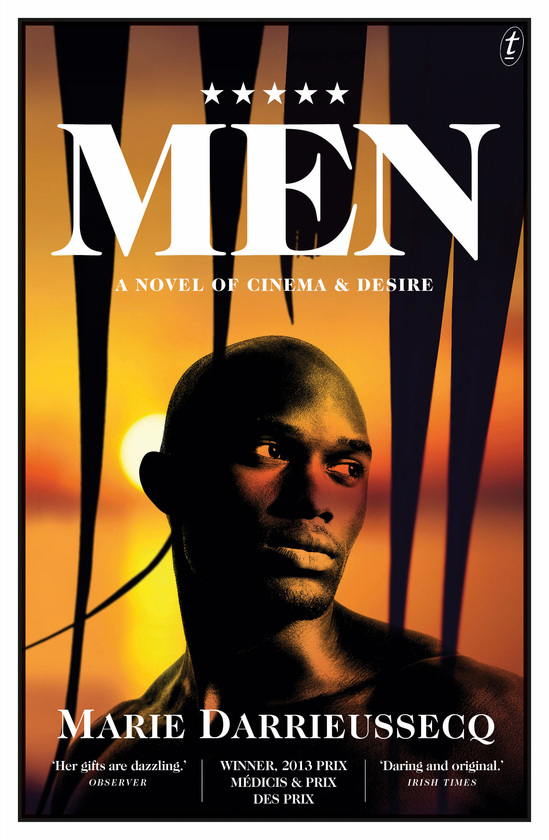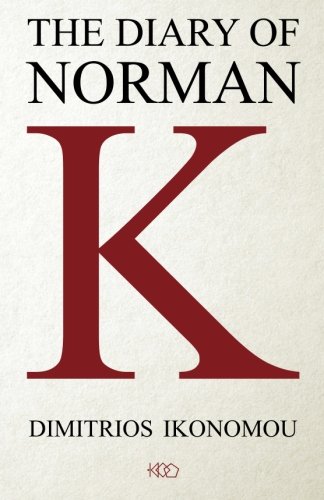In this special “on location” Sydney Writers Festival show, Vivian Gornick reads from and talks about the writing of her latest book The Odd Woman and the City, about the nature (and freedom) of “oddness”, about the joy and vitality…
Category: Literary Fiction Reviews
A review of Men by Marie Darrieussecq
 Solange’s journey is one that takes her into her own heart of darkness, where she finds her limitations, her humiliations and restrictions, and the cultural, political, gendered and racial stereotypes through which she has defined herself. Throughout the novel she begins to unravel these, unwinding herself slowly until she is temporarily removed altogether as subject.
Solange’s journey is one that takes her into her own heart of darkness, where she finds her limitations, her humiliations and restrictions, and the cultural, political, gendered and racial stereotypes through which she has defined herself. Throughout the novel she begins to unravel these, unwinding herself slowly until she is temporarily removed altogether as subject.
A review of The Diary of Norman K by Dimitrios Ikonomou
 It takes strength of character to pursue, and create, human wretchedness in all its shapes for 360 pages. Like many unreliable narrators before him, Norman K ranges from obnoxious to villainous in his pretension, and The Diary of Norman K shows how uniquely we puts on airs, down to a style of speech best described by his “friend” Russell as “an Elizabethan aristocrat who had just woken up from a two-hundred-year coma.
It takes strength of character to pursue, and create, human wretchedness in all its shapes for 360 pages. Like many unreliable narrators before him, Norman K ranges from obnoxious to villainous in his pretension, and The Diary of Norman K shows how uniquely we puts on airs, down to a style of speech best described by his “friend” Russell as “an Elizabethan aristocrat who had just woken up from a two-hundred-year coma.
Dimitrios Ikonomou reads from and chats about The Diary of Norman K
Author and scultor Dimitrios Ikonomou reads from his new novel The Diary of Norman K, and chats with Justin Goodman about his book and its origins, his characters, on having an unreliable narrator on an unreliable journey, on meta-fiction, on…
A review of The Bricks that Build the Houses by Kate Tempest
 Beneath the fun, fast, and well-plotted story, is a deep poetic exploration of yearning, creativity, and the constrictions of poverty. The characters live between pulses of transcendence that take place as they struggle to create meaning from their hand-to-mouth lives.
Beneath the fun, fast, and well-plotted story, is a deep poetic exploration of yearning, creativity, and the constrictions of poverty. The characters live between pulses of transcendence that take place as they struggle to create meaning from their hand-to-mouth lives.
A review of He Runs the Moon by Wendy Brandmark
 Themes of identity and belonging disturb the calm surface of Wendy Brandmark’s collection of short stories, which are set in Denver, New York and Boston in the 1950s, 1960s and 1970s. Many of the stories concern characters who have been displaced geographically and emotionally: young or old, successful or unsuccessful, their lives have slipped their moorings.
Themes of identity and belonging disturb the calm surface of Wendy Brandmark’s collection of short stories, which are set in Denver, New York and Boston in the 1950s, 1960s and 1970s. Many of the stories concern characters who have been displaced geographically and emotionally: young or old, successful or unsuccessful, their lives have slipped their moorings.
A review of Re-Enchanting Nature by David Vigoda
 Readers who look for a novel well steeped in philosophy which takes the classic love scenario and turns it upside down will find much to relish in this evocative story of adventurers who seek to reinvent not just themselves and each other, but their worlds.
Readers who look for a novel well steeped in philosophy which takes the classic love scenario and turns it upside down will find much to relish in this evocative story of adventurers who seek to reinvent not just themselves and each other, but their worlds.
A review of Diaboliad & Notes on a Cuff by Mikhail Bulgakov
 These two handsome and distinctive paperbacks form part of a series showcasing the work of Russian Master Mikhail Bulgakov. Some of the stories in Notes on a Cuff appear in English for the first time, so this is a real treat for Bulgakovians. In addition, both books include valuable textual apparatus: photographs (Mikhail was quite the dandy), notes and a concluding section on the life and work of Bulgakov.
These two handsome and distinctive paperbacks form part of a series showcasing the work of Russian Master Mikhail Bulgakov. Some of the stories in Notes on a Cuff appear in English for the first time, so this is a real treat for Bulgakovians. In addition, both books include valuable textual apparatus: photographs (Mikhail was quite the dandy), notes and a concluding section on the life and work of Bulgakov.
A review of The Fugue by Gint Aras
 The Fugue is thus a novel of paradoxes. Inspired by a notion of the harmonious and contrapuntal progression of musical voices through time, it is equally a story about being stuck in someone else’s nightmare. An epic saga of family lives and losses, it is also a chamber piece with surprisingly few characters. Located squarely in Cicero, its moral implications ripple outwards to cover the entire world. I could not help remembering that faire fugue, in French, means to run away.
The Fugue is thus a novel of paradoxes. Inspired by a notion of the harmonious and contrapuntal progression of musical voices through time, it is equally a story about being stuck in someone else’s nightmare. An epic saga of family lives and losses, it is also a chamber piece with surprisingly few characters. Located squarely in Cicero, its moral implications ripple outwards to cover the entire world. I could not help remembering that faire fugue, in French, means to run away.
Rebecca Starford on Bad Behaviour
In this special Newcastle Writers Festival episode, Rebecca Starford, the author of Bad Behaviour, reads from and talks about her memoir and how it came about, her “characters” and why she needed to revisit them, about the complex and fuzzy…